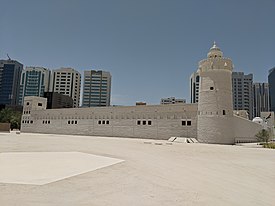| Qasr Al Hosn | |
|---|---|
 Qasr Al Hosn in May 2019 | |
| Location | Sheikh Zayed the First Street |
| Coordinates | 24°28′57″N 54°21′17″E / 24.48239°N 54.35482°E |
| Built | 1931 outer Fort with 30 m high main watchtower around the 1761 inner fort |
The Qasr Al Hosn (Arabic: قصر الحصن, Qaṣr al-Ḥuṣn, "Fortified Palace") is a historical landmark and the oldest stone building in the city of Abu Dhabi, the capital of the United Arab Emirates. Its construction was supervised by Mohammed Al Bastaki[1] in 1761.[2]

Location
It is located along Rashid Bin Saeed Al Maktoum St[3] and is a part of the Abu Dhabi Cultural Foundation.[4]
History
Qasr Al Hosn, also known as the White Fort (originally not white in colour but painted bright white during 1976–1983 renovations) or Old Fort,[5] was constructed in 1761 as a conical watchtower to defend the only freshwater well in Abu Dhabi island.[2] The tower was later expanded into a small fort in 1793 by the then ruler, Shakhbut bin Dhiyab Al Nahyan, and became the permanent residence of the ruling Sheikh.[2] The tower took its present shape after a major extension in the late 1930s, aided by revenues received for granting the first oil license in Abu Dhabi.[6] It remained the emir's palace (hence the name Qasr Al Hosn, meaning Palace fort) and seat of government until 1966.[2] The fort had been refurbished several times and is now partially open to the public.[7][8]
Current use
The Qasr Al Hosn is currently the subject of extensive historical, archaeological, and architectural research.[4][9] The fort houses a museum displaying artifacts and pictures representing the history of the country.[5] It also has a range of weapons, used through the region's history, on display.[5]
Qasr Al Hosn festival

Qasr Al Hosn festival is an annual 11-day cultural event staged on the grounds of the fort.[10][11] The fort is open to the public during the festival, including some of the restricted areas[11] and features live music and dance performances showing the UAE's cultural heritage.[8]
References
- ^ "قصر الحصن حارس تاريخ أبوظبي". صحيفة الخليج (in Arabic). Retrieved 2021-01-26.
- ^ a b c d "UAE museum: Qasr Al Hosn in Abu Dhabi". Gulf News. 2 November 2008. Retrieved February 12, 2015.
- ^ "QASR AL HOSN - Abu Dhabi Culture". Cultural Foundation. Retrieved April 22, 2019.
- ^ a b "National". National. 12 February 2015. Retrieved February 12, 2015.
- ^ a b c "My destination". My destination. 2015. Retrieved February 12, 2015.
- ^ "Dubaifaqs". Dubaifaqs. 22 April 2014. Retrieved February 12, 2015.
- ^ "UAE Interact". UAE Interact. 29 July 2007. Retrieved February 12, 2015.
- ^ a b "Khaleej Times". Khaleej Times. 12 February 2015. Archived from the original on 12 February 2015. Retrieved February 12, 2015.
- ^ "Muntada Qasr Al Hosn serves as key platform". Gulf News. 2 March 2013. Retrieved February 12, 2015.
- ^ "Festival home". Qasr al Hosn Festival. 2015. Retrieved February 12, 2015.
- ^ a b "Take a trip down memory lane at Qasr Al Hosn". Gulf News. 11 February 2015. Retrieved February 12, 2015.
External links
- Frauke Heard-Bey (2004). From Trucial States to United Arab Emirates. Motivate Publishing. p. 540. ISBN 9781860631672.
- Reem El Mutwalli (1995). Qasr al Husn, An Architectural Survey. Royal Publishing House.
- Jayanti Maitra (2001). Qasr al Hosn: The History of the Rulers of Abu Dhabi 1793–1966. National Center for Documentation and Research. p. 262. ISBN 978-1860631054.
- Official Website









